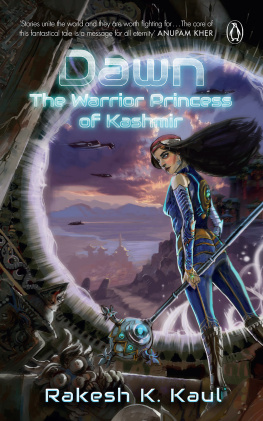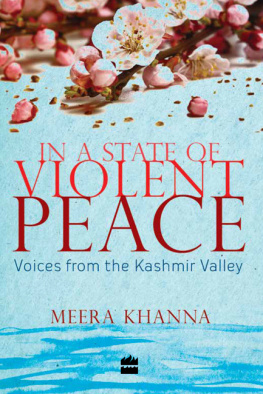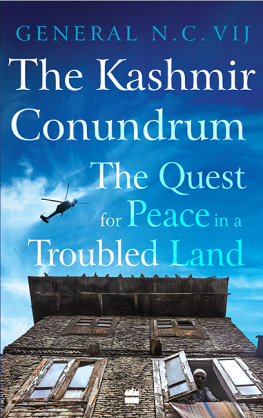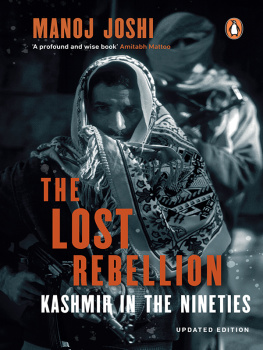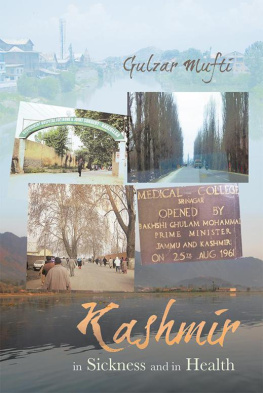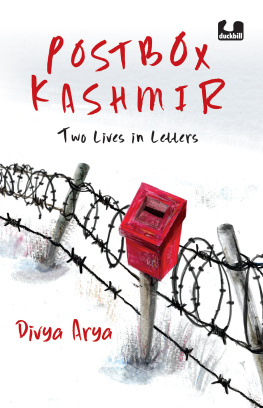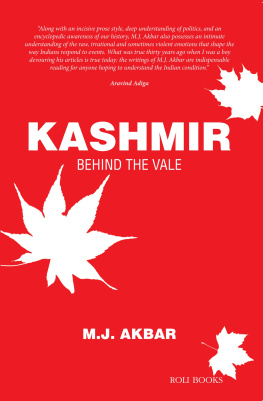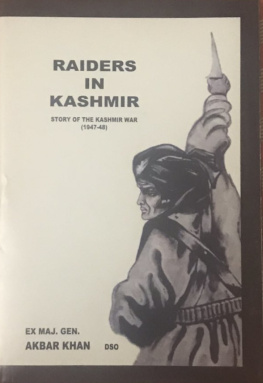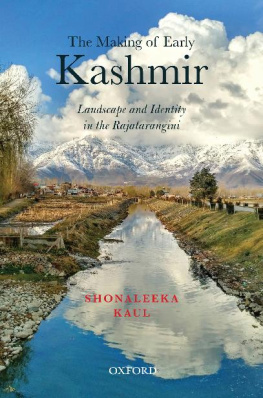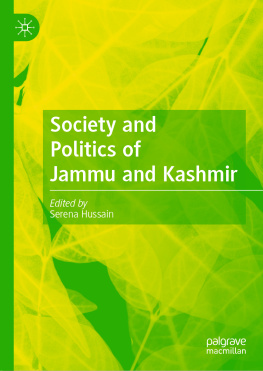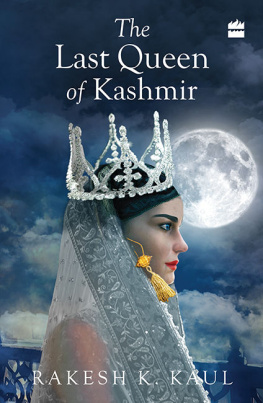Rakesh Kaul, an IIT gold medallist, migrated to the US in 1972. He was a founding contributor to the first Chair of India Studies at University of California, Berkeley, the Center for the Advanced Study of India at University of Pennsylvania and the Mattoo Center for India Studies at the State University of New York. He is the author of the bestseller The Last Queen of Kashmir. Kaul has had a distinguished business career as CEO and held leadership positions of publicly traded companies in the US. He serves as the Vice Chair of the Indo-American Arts Council.
Advance praise for the Book
Stories unite the world and they are worth fighting for... The core of this fantastical tale is a message for all eternityPadma Bhushan Anupam Kher, actor and author of Lessons Life Taught Me, Unknowingly: An Autobiography (Hay House India, 2019)
Brilliant, original and magically creative, Rakesh Kauls Dawn: The Warrior Princess of Kashmir sees Kashmiri wisdom come alive through the genre of science fictionPadma Shri Amitabh Mattoo, professor of international studies at Jawaharlal Nehru University, foundation director of the Australia India Institute and former adviser to the chief minister of J&K
Dawn: The Warrior Princess of Kashmir is an epic novel in the style of Brave New World, but it goes much further beyond that classic. Set in 3000 AD, it presents a dystopic vision of the world that is run using mind control and AI. It is the story of the last free individuals who challenge the tyrant and eventually triumph. A story at many different levels, its deepest narrative is about the workings of Universal Consciousness. The book connects this storyset in the futurewith the mystical past of Kashmir. It is a book to be savoured in multiple ways. A tour de force!Padma Shri Subhash Kak, regents professor emeritus, Oklahoma State University
In the true spirit of our master storyteller ancestors from Kashmir, Kaul builds a mesmerizing maze of a narrative. Read him for this very pure joyRahul Pandita, journalist and author of Our Moon Has Blood Clots: A Memoir of a Lost Home in Kashmir (Penguin Random House India, 2014) and Hello, Bastar: The Untold Story of Indias Maoist Movement (Tranquebar Press, 2011)
The displacement of Kashmiri Pandits from their ancestral, beautiful valley of Kashmir is one of the poignant tragedies of our time, made more so when viewed in light of the multitudinous riches they brought to civilization. The telling is not easy, but Rakesh Kaul, author of the acclaimed The Last Queen of Kashmir, brings this story alive for todays readers, especially youths. Drawing on techniques as ancient as the earliest animal fables known to man, the Panchatantra, and as current as the latest in AI and science fiction, Kaul has produced an absorbing work of fiction based on history, mythology and literature, that is at once entertaining and stimulatingKamal K. Sridhar, associate professor of linguistics at the Department of Asian and Asian American Studies and associate director of Bishembarnath & Sheela Mattoo Center for India Studies at the State University of New York
Rakesh Kauls book dishes out a kaleidoscopic admixture of fabulation, metafiction, futurism and fantasy. Kashmir, in the authors consciousness, as it emerges in the tripartite structure of the narrative becomes a syntagm of all Indic folk stories: The Body, The Mind and finally, Life. Kauls book reflects an epicentric shift from the millennial to the cataclysmic and climactically closes the narrative with a pronounced shift to an optimistic renewal, as in the Biblical Revelation: After the demonic apocalypse, a new heaven and a new earth will emerge. The book is a must for scholars and teachers alikeAshok Aima, vice chancellor, Central University of Jammu
One wonders at the mind of an author who so poetically yet powerfully, imaginatively yet injunctively, weaves together not only the past and the present but, this time, also the future. A novel truly for our anchorless lives and times, Dawn is part-fantasy, part-reality, but always authentic truth. Riveting stuffand such fun along the way!Shonaleeka Kaul, professor of ancient history, Centre for Historical Studies, Jawaharlal Nehru University
Skilfully weaving these age-old Niti stories together with everything from extraordinarily imaginative futuristic science and technology to the history of Kashmir and the remarkable contributions its people have made to the world, Kaul illuminates not just the vital importance of the love and strength held in the heart of every woman, but the unimaginable power of the cosmic feminine forceTeri Degler, author of The Divine Feminine Fire: Creativity and Your Yearning to Express Your Self (Dreamriver Press, 2009)
The modern-yet-ancient Niti story told by Rakesh Kaul both preserves and revives the story of Kashmir itself. Dawn: The Warrior Princess of Kashmir is blessed with some amazing pratibh of his own having inexplicable insights into the ancient yogic science preserved by the Kashmiri Pandits so many centuries ago in texts... Yet, the story of Dawn is one of universal Awakening that pertains to all and is not limited to Kashmir. In praising the omnipresence of Mah, he proclaims that the role of the Kashmiri Pandit is to preserve the collective memory of the great awakening that occurred in Kashmir for the sake of all beingsChristopher Tompkins, PhD Candidate on Kashmir Shaivism and yoga practitioner, University of California, Berkeley
Amazing the things you find when you bother to search for them.
Sacagawea, the Native American woman who served as an interpreter and guide during the Lewis and Clark Expedition
Preface
Storytelling, irrespective of the medium, is the oldest living art form known to humanity. Among the most widely read stories in the world are the tales of the Panchatantra. Recounted to princes 2,200 years ago, these stories provide wise counsel on the way of life via animals who portray the central characters in the Panchatantra; to cite an example, the wise crows overcome the owls who were their predators. However, in the present times, many prefer technologyespecially gamingto reading stories, calculation to conduct and machine to life. No wonder, todays youth are caught in the spell of the siren song of life-threatening viral games and social media trends or mind-numbing ideologies. The horrible whistle of these manipulative cyber Pied Pipers has scared children and adults alike. In the eyes of a teenager, reality is perceived as unjust, chaotic, hopeless and evil. The only way forward, as directed by the invisible and manipulative gamemasters, is one that poses life-threatening quests. Tragically, sometimes this can lead to self-harm and a mad race to stop the participants from eventually writing a suicide note or posting a selfie video, The End.

